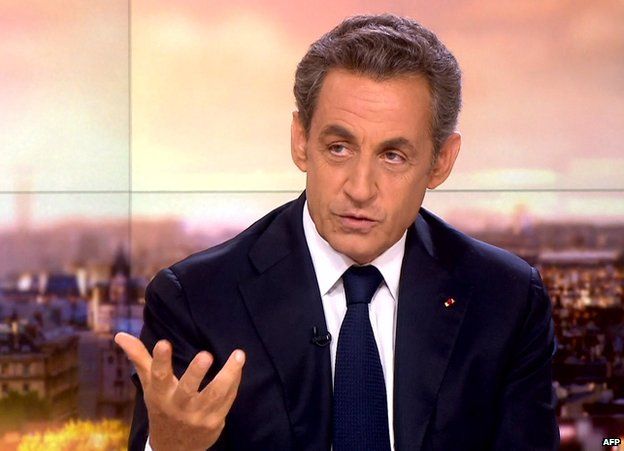Nicolas Sarkozy sets out to woo French voters
- Published

France is digesting the news that its former president, Nicolas Sarkozy, is returning to politics and seeking to lead the centre-right opposition party, the UMP.
Many see it as the start of a three-year journey leading back to the presidency. But how is the relaunch of the Sarkozy brand going down?
"It really is him," said the headline in Le Parisien.
Yes, the hair was greyer, and there was talk of having made mistakes and of learning from experience, but Nicolas Sarkozy's 45-minute performance on Sunday night's prime-time news bulletin was instantly recognisable.
"Sarkozy is a showman," said former Prime Minister Jean-Pierre Raffarin. "When you give him microphones and cameras, he knows how to use them."
Many commentators and fellow politicians seem to agree that two years out of politics have not really changed their flamboyant, straight-talking former president.
'Incredible energy'
He posed as a calmer and wiser man, according to left-wing newspaper Liberation, but did not properly address his mistakes - or the funding scandals hovering around his last presidential campaign. And he could not hide "that belligerent spirit that he never managed to get rid of".
"Of course he hasn't changed," Christian Makarian, editor at the right-wing L'Express told me. "But he still has the same incredible energy, and this is something people miss - especially with [President] Hollande. Sarkozy's strength is his own personal energy, but his weakness is that all his plans are based on that - it's both a strength and a weakness."
In his Sunday night TV interview, Mr Sarkozy said his decision was not a question of personal ambition, but duty. "France is collapsing. People don't believe in politics anymore. I've never seen such anger in France.
"Staying on the sidelines as a spectator would be to abandon my country. Not only do I want [to come back], I have no choice."
He criticised the current government for its handling of the economy and a lack of vision, and promised to bring new ideas. But the broad plans he outlined - boosting the competitiveness of French companies and improving Europe's economy - failed to satisfy many of his detractors.
Ghosts from past?
"He should take a good look at himself in the mirror," said the far-right National Front leader Marine Le Pen. "Every morning I congratulate myself for not voting for him [in the 2007 presidential election] because his policies and President Hollande's policies are exactly the same."
"He's in a paradoxical situation," says Christian Makarian. "Mr Sarkozy's strategy is to try something new with old ingredients - it's the first time a former president tries to appear new and it's a challenge for him."
In Paris's business district at Monday lunchtime the mood was less of something fresh and new, than a long-awaited return to a growing political crisis.
"I'm quite positive about it," one man told me. "I think the government of Francois Hollande is a total mess, so I think Sarkozy will bring seriousness back into the political field, especially for the UMP, which is also a mess."
"He's a power addict, obviously," said another. "He was president of France for five years. It's not surprising that he's trying to come back, but he's got a lot of handicaps."
"It's not really a surprise," said businesswoman Nancy Perrein. "He has been preparing his return. There are many problems, on both the political left and the right. I think he's trying to take this opportunity to create a good image for himself."
Fractured party
Despite devoting much of his television appearance to the "despair" of the French nation, and the "hopelessness" of voters, Mr Sarkozy is currently relaunching himself as a candidate to lead the UMP, not to become French president. That, he said, comes later.
There is no doubt Mr Sarkozy has many supporters within the party, which is fractured and largely unable to capitalise on President Hollande's unpopularity.
According to the right-wing paper, Le Figaro, his announcement "closes a lacklustre chapter in the French right wing, where the opposition has wavered between pitiful and ridiculous".
His bid to take over the party leadership in November is widely expected to succeed. But few believe that is where Mr Sarkozy's political ambitions end. And if he does run for the presidential nomination of his party in 2016, he is likely to face at least two other contenders.
"He dismissed [those] rivals," noted Liberation on Monday, "but times have changed: his rivals are no longer as resigned as they were 10 years ago and his personality and political talent alone aren't enough. There's open warfare within the party - it's a war, and Mr Sarkozy would be mistaken to think it's already been won."
One of those rivals for the presidential ticket in 2017, Alain Juppe, put it more succinctly: "The match has started," he said, "let the tackling begin!"
- Published1 March 2021
- Published29 March 2018